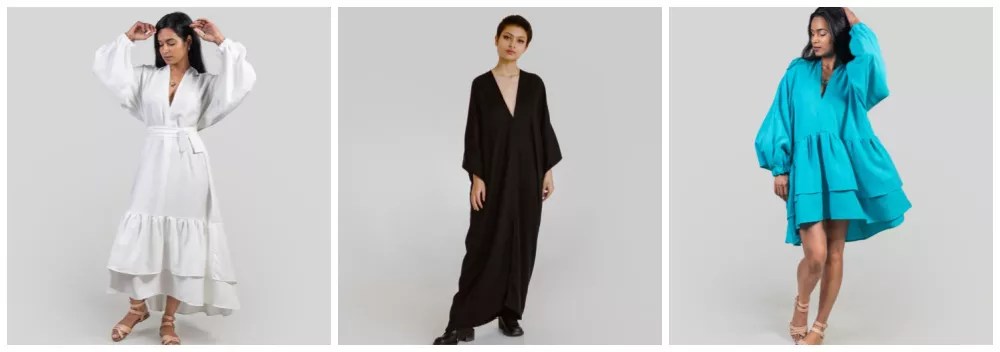
Chiara Garland

Audio By Carbonatix
They say good things come to those who wait. For customers of Meçlâ fashions, that wait can be two to four weeks for a top or a dress. The result is a quality piece of locally made, sustainably sourced clothing.
The company’s head, Denver designer Meçlâ Soyer-Kaplan, is part of the slow-fashion movement that promotes environmental responsibility and ethical practices and advocates for higher quality and more creativity in the industry.
The movement, which took off over the past decade, started as a response to the rise of fast fashion: the mass production of high volumes of trendy clothing using cheap materials to keep the costs low. The result? A disposable and wasteful fashion culture.
According to the U.S. Environmental Protection Agency, 17,030 tons of textiles were generated when last measured in 2018. Out of that, only 2,510 tons were recycled and 11,300 tons were sent to landfills.
It’s something Soyer-Kaplan put a lot of thought into when starting her Meçlâ brand.
“I looked at the fashion industry and its impact on the environment, and it’s not great,” she says. “So it really influenced my decision to source my materials as responsibly as I can, produce locally, hire locally and pay a livable wage.”
She will be one of a group of designers speaking at a Slow Fashion panel at the Sustainable Fashion Weekend event at the Dairy Block on Friday, May 14, at 6 p.m.
Soyer-Kaplan, who grew up in North Carolina, went to college for fashion design and spent time working in the industry in New York City and Los Angeles before eventually settling in Denver in 2007.
“I felt I could start my own business in Denver,” she says. “I’ve really seen the fashion industry grow here over the last five years. For so long, people thought of this city as a cowtown. But more people moved here; a lot of talent is here, and a lot of support for local businesses.”
Soyer-Kaplan’s sustainability journey started with her first business, a school teaching elementary-school-age children fashion design.
“We bought things in thrift stores and garments from home and upcycled them by turning them into new clothes,” she recalls. Creating those items reignited her love of design. “I worked in buying, merchandising, styling and selling. Then I realized what inspires me the most is dressing women of all shapes and sizes and figuring out what makes them feel good about themselves, because so much of that is through the clothing we wear.”

Fashion designer Me
Me
Her biggest inspiration goes back to her Turkish grandmother, after whom she and the brand are named. “She was really fabulous,” Soyer-Kaplan says. “She altered her clothes to fit perfectly, always wore heels and wigs. She was just really cool and different.”
After spending years working with high-fashion designers and wearing their clothes, Soyer-Kaplan grew to realize the importance of having good-quality clothing. “It made me want to make things that are going to last, and people will want to keep,” she says.
When a customer wants a Meçlâ design, they can either pull what’s available off her rack at the Five Points boutique Matriarch Mercantile or place an order on her website, which starts the made-to-order process.
“Either I sew it or my assistant does, from start to finish,” explains Soyer-Kaplan. “It’s not a factory. We stay in touch with the customer throughout the process so they aren’t worried about where it is. We keep it personable.”
While fast fashion dictates churning out several collections of clothing every year, Meçlâ is more about adding to a permanent collection.
“I launch about one piece in two colors every two months,” Soyer-Kaplan says. “I take my time launching things and put a lot of thought into it. You can wear the clothing year-round, layer it and style it in different ways.”
Her pieces consist of free-flowing shapes that drape over the body with interesting structural details such as deep slits, ruffles or oversized bows.
“From the very beginning, I’m thinking about what will work on most people,” Soyer-Kaplan says. “A lot of my designs are one size, so they will work on different body shapes and sizes. I think loose, flowing clothing is so beautiful and versatile.”
The fabrics are key to the movement of the clothes. Soyer-Kaplan uses cotton muslin from a cruelty-free, fair-trade manufacturer in Turkey, and Tencel Lyocell from a Standard 100 by OEKO-TEX-certified company, meaning it’s been tested for harmful substances. She also helps to save fabrics discarded by other designers from landfills by purchasing deadstock from a warehouse in L.A.
As a small independent designer, Soyer-Kaplan says she enjoys being part of a network of small businesses in Denver that believe in producing locally, sustainably and ethically. She looks forward to sharing that with the Sustainable Fashion Weekend event.
“There’s a growing community here around slow fashion…educating people that you can have fashionable things that are ethically made, and you can feel good about it.”
A slow-fashion panel discussion takes place at 6 p.m. Tuesday, May 14, at Dairy Block in the Alley, 1801 Blake Street. Tickets are $30 and can be purchased online at the Dairy Block website. The event precedes Sustainable Fashion Weekend, Saturday and Sunday, May 15 and 16.